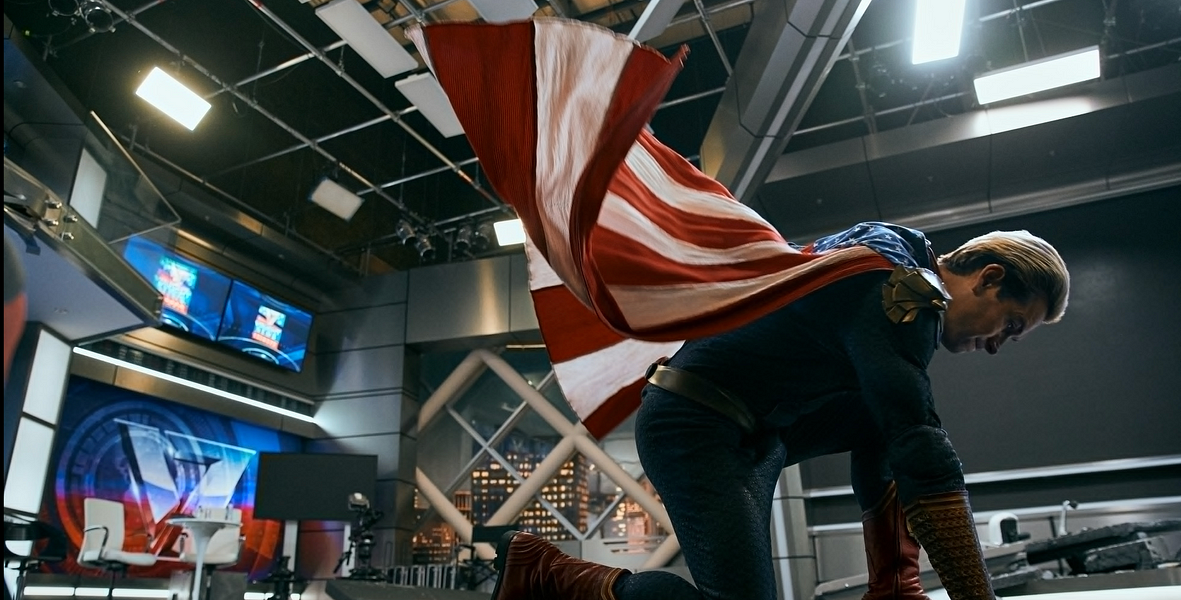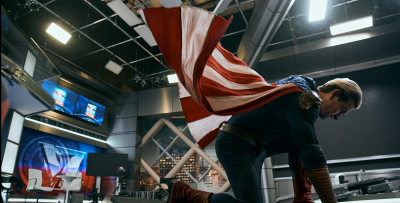Nobody could accuse The Boys of being subtle. Amazon Prime’s satire of our superhero-obsessed culture loves to shock its audience with gratuitous sex and violence: Civilians explode into bits when a hero with super speed runs through them, the protagonists defeat a hero with impenetrable skin by shoving a bomb up where the sun doesn’t shine, and a character with the ability to shrink to the size of a termite uses his power to stimulate his partner in a way that would make a urologist squirm.
For context, in the world of The Boys, the “heroes” are little more than superpowered celebrities, all brand-tested and micromanaged by the mega-corporation Vought. The supes behave with wonton licentiousness and cruelty, but Vought maintains their popular public image. The protagonists of the show are the titular “boys,” a team of ex-soldiers, mercenaries, and ordinary blokes who’ve been hurt by Vought. Team leader William “Billy” Butcher seeks revenge on Homelander, the show’s twisted version of Superman, who he believes killed his wife. Hughie Campbell has it out for A-Train, a supe with powers like the Flash, for the death of his girlfriend. Mother’s Milk remains obsessed with Soldier Boy, who is like Captain America if his worldview never evolved past the 1940s, because Soldier Boy caused the death of his grandfather. The team’s mission to get revenge on the supes often devolves into the aforementioned gratuitous violence.
The show’s immediate appeal comes from its willingness to skewer all sides. Vought is one-part Fox News, one-part Disney, a stand-in for both right-wing infotainment media and corporations that superficially and self-interestedly support progressive causes in order to sell products. According to showrunner Eric Kripke, Homelander is a “Trump analogue,” but he also represents “a bigger issue than just Trump. The more awful public figures act, the more fans they seem to be getting.”
The show’s interest in the competition for power between celebrities, corporations, politicians, and ordinary people leads The Boys into its most philosophical territory. From its beginning, the show has reflected Thomas Hobbes’ understanding of power. Season 3, which just concluded, explores and ultimately rejects might-makes-right morality.
In his Leviathan, Hobbes described many different types of power, including:
Extraordinary strength
Riches that procure “friends and servants”
Eloquence, “because it is seeming prudence”
And reputation of power and of “love of a man’s country, called popularity,” because it “draws the adherence of those that need protection”
Homelander has “extraordinary strength,” not to mention the ability to fly and shoot lasers out of his eyes. With Vought at his back, Homelander also possesses “riches” as well as the “eloquence” of Vought’s PR team. But Homelander also wants to be loved by the masses, so he must preserve his reputation. Characters much weaker physically than Homelander exercise power over him because they possess the means to harm or help his reputation.
Because power is so diverse and dispersed, Hobbes noted that even “the weakest has strength enough to kill the strongest, either by secret machination or by confederacy with others.” That is precisely what Butcher’s team did to several of Vought’s heroes throughout the first two seasons. In Season 3, Butcher’s latest “secret machination” involves taking Temp V, a substance that grants users temporary superpowers. Butcher and Hughie also attempt to form a “confederacy” with Soldier Boy.
However, the show challenges the protagonists’ do-whatever-it-takes tactics. Temp V exacts a major toll on users’ bodies. And Mother’s Milk objects strenuously to teaming up with Soldier Boy, for good reason. The team fractures as some characters start to realize that when they fight fire with fire, everybody burns.
Hobbes also recognized this danger. To Hobbes, the ability of each person to threaten the life of every other person meant that “without a common power to keep them all in awe, they are in that condition which is called war; and such a war as is of every man against every man.” At the start of Season 3, that “common power” is the Federal Bureau of Superhuman Affairs, a new agency established to provide oversight of the superheroes. Butcher’s team and Vought remain in an uneasy détente, each attempting to accomplish their goals through bureaucracy rather than through violence.
The best scene in the season comes in the first episode, when Homelander visits Butcher to complain about the new status quo—as he puts it, the “wheeling and dealing and the giving and taking just to keep everything exactly the same.” Both men crave a final, decisive confrontation. Their conversation brings to mind recent calls by radicals on both the left and right to spurn our institutions of conflict-resolution and to embrace “revolution” or strongmen. However, when the bureau fails and the characters return to a state of war, the pain and deaths that follow serve as a reminder that engaging in raw power politics ultimately destroys ourselves and everything we love.
It is a shame that such an important message comes in a middling package. Season 3 is the show’s weakest. Certain plotlines are dropped without so much as a mention, perhaps because the creative team expected—correctly—to be renewed for a fourth season, and so saved certain resolutions for later. Some of the show’s satire—including explicit references to “cancel culture” and vague allusions to America’s response to COVID-19—is less clever and more ham-fisted than in previous seasons. The sixth episode, “Herogasm,” which the showrunner teased enthusiastically, fails to live up to the hype.
Fortunately, the show remains buoyed by charismatic performances, including Antony Starr as Homelander, Karl Urban as Butcher, Jack Quaid as Hughie, Jessie Usher as A-Train, Laz Alonso as Mother’s Milk, and newcomer Jensen Ackles as Soldier Boy. On top of all that, the message of The Boys shines bright, and it is one Americans need to hear right now: Might does not make right.






Please note that we at The Dispatch hold ourselves, our work, and our commenters to a higher standard than other places on the internet. We welcome comments that foster genuine debate or discussion—including comments critical of us or our work—but responses that include ad hominem attacks on fellow Dispatch members or are intended to stoke fear and anger may be moderated.
With your membership, you only have the ability to comment on The Morning Dispatch articles. Consider upgrading to join the conversation everywhere.